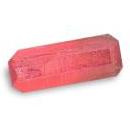|
|
|
|
Click on a letter above to view the list of gems. |
|
|
|
|
|
Rhodonite |
|
| Chemistry: MnSiO3 [Manganese Iron Magnesium Calcium Silicate] | |
| Discovered
in 1819;
IMA
status: Valid (pre-IMA; Grandfathered). | ||
|
| ||
|
Classification |
|
|
| |
|
Silicates | |
|
8/F.27-10 | |
|
|
9 : SILICATES (Germanates) |
|
Related to: |
Rhodonite - Inesite Series |
|
|
|
|
Crystal Data |
|
|
|
|
|
Crystals rough, with rounded edges, typically tabular and elongated, to 20 cm; commonly massive, cleavable to compact. |
|
|
Lamellar, with [010] as composition plane. |
|
|
|
|
|
Physical Properties |
|
|
|
|
|
[110] Perfect, [110] Perfect |
|
|
Conchoidal to Irregular/Uneven |
|
|
Brittle |
|
|
5.5 - 6.5 |
|
|
3.57 - 3.76 (g/cm3) |
|
|
None |
|
|
Not Radioactive |
|
|
|
|
|
Optical Properties |
|
|
|
|
|
Pink, Rose Red, Brownish Red, Yellow, Black; exterior commonly black from manganese oxides |
|
|
Translucent to Transparent |
|
|
Vitreous, somewhat Pearly on cleavages |
|
|
1.711 - 1.751 Biaxial ( + ) |
|
|
0.0130 |
|
|
None; r < v |
|
|
Weak; X = yellowish red, Y = pinkish red, Z = pale yellowish red |
|
|
|
|
|
Occurances |
|
|
|
|
|
Geological Setting: |
In manganese-bearing deposits formed by hydrothermal, contact and regional metamorphic, and sedimentary processes. |
|
Common Associations: |
Calcite, Franklinite, Willemite (Franklin, New Jersey, USA); Alleghanyite, Calcite, Galaxite, Grunerite, Magnetite, Tephroite (Bald Knob, North Carolina, USA). |
|
Type Locality: |
Kaiser Franz Mine (Kuxloch Mine; König Wilhelm Mine), Schävenholz (Schebenholz; Schäbenholz), Elbingerode, Wernigerode, Harz Mts, Saxony-Anhalt, Germany |
|
Year Discovered: |
1819 |
|
View mineral photos: | |
|
|
|
|
More Information |
|
|
|
|
|
| |
|
|
|
|
Most
Rhodonite sources only produce massive, opaque speciments.
A few locations for gemmy crystals include Broken Hill, Yancowinna County, New South Wales,
Australia; Minas Gerais, Southeast Region, Brazil; and Huallanca, Bolognesi Province, Ancash Department, Peru. |
|
|
We
have not photographed our Rhodonite gems yet. Please
check back soon! |
